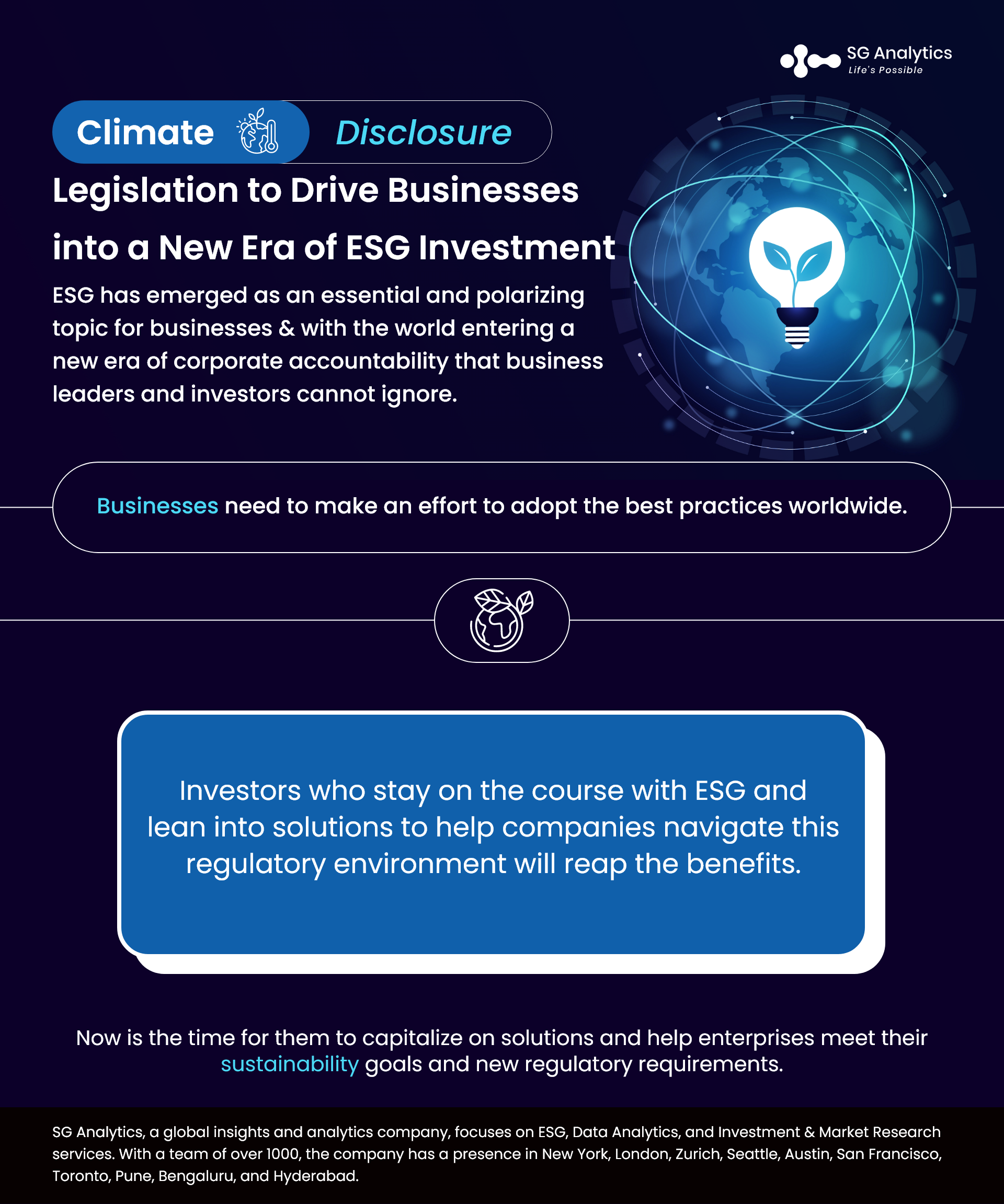The ESG landscape is constantly changing and requires additional resources to meet investor as well as regulatory expectations.
Regulatory Infrastructure for ESG
Financial regulators across multiple jurisdictions have zeroed in on ESG practices to enhance their scrutiny and rulemaking. And this regulatory pressure is creating new laws on the road for ESG data providers and users.
Aggressive regulation in the EU, the UK, and Asia have made the US a laggard in this space. While the SEC heightened its ESG focus and is deliberating over potential rulemaking for the U.S., regulatory bodies across the country are attempting to take their stands on implementing ESG data and analysis to manage their state's money and create quasi-regulated environments. This is in contrast to current and proposed regulations in the EU legislation on the transparency and integrity of ESG rating activities.
Critical undercurrents in the ESG ecosystem are further creating misleading conclusions about ESG data. While reporting consumers and investors are focused on demand over time, data providers are developing better sources and tailored products to monetize the analysis. In such situations, it becomes critical for businesses to study and understand the wide variety of investment and research use cases that make ESG data useful to many managers and consumers of ESG data and challenging to compare.
Read more: Leveraging Technology to Meet Sustainability Targets
What can be characterized as a win for the planet but a challenge for businesses are the two new first-in-the-nation bills passed by the California legislature. The bill manifests the leadership in the battle against climate change. This bill will impose mandatory greenhouse gas emissions reporting obligations for public as well as private companies with annual revenues exceeding $1 billion doing business in California.

The legislature is being considered a game-changer as it will usher businesses into a new era of corporate transparency, requiring them to disclose their Scope 1 as well as Scope 2 GHG emissions from the prior year and their Scope 3 GHG emissions from the prior year. Scope 3 emissions encompasses indirect upstream and downstream GHG emissions other than scope 2 emissions. These can include purchased goods and services, business travel, and employee commutes. Today, very few organizations attempt to calculate Scope 3 emissions.
With this bill, California has become the first state to impose mandatory Scope 3 GHG emissions reporting and climate-related financial risk disclosure obligations on nonpublic businesses. The mandatory reporting of Scope 3 GHG emissions will provide cover for the government to finalize its regulation of Scope 3 emissions.
Read more: Corporate Sustainability Reporting Directive
Following the ESG regulations, businesses will have to calculate emissions using the GHG Protocol, and reporting must be third-party verified. The collected Scope 3 emissions data will help in creating effective climate action plans. It will also pave the way for businesses to set ambitious emission reduction targets that align with their global climate goals. This level of transparency will further equip investors, stakeholders, and the public to understand a firm's true impact of climate change. The visionary legislation underscores its dedication to climate action along with its commitment to making businesses responsible for their environmental impacts.
Opportunities that ESG Presents for Companies and Investors
Companies are integrating measures to meet climate commitments as well as new regulatory requirements and shift to market-driven solutions. For business leaders, it is critical to enhance their ESG practices and incorporate genuine measures for their impact on the environment. There is an incredible investment opportunity for solutions that will enable companies to meet their ESG objectives.

Technology solutions are assisting companies in operating more sustainably, cutting their offset carbon, and even measuring and reporting on their environmental and social impact. In addition, regulations are driving backup ESG investments. These investments in ESG are set to rebound in response to consumer demand. Even consumers are in overall support of sustainable practices as brand sustainability practices are influencing their purchasing decisions.
Read more: Navigating the Responsible ESG Marketing Landscape
ESG Regulations as Climate Action Catalysts
ESG is not a new phenomenon worldwide. Businesses and investors across the globe are taking lessons from the shortcomings faced by the European Union and the United States of America, which are considered the forerunners in the arena. With a balanced approach, businesses can expect a perfect outcome. However, they are likely to face unique challenges that can only be overcome by hit and trial. Nevertheless, businesses should make an effort to adopt the best practices worldwide.
Among various actions required, one of the primary needs of the time is a compiled code regulating ESG instead of multiple legislative snippets. There is also a growing need to revisit the environmental laws as far as the penalty prescription is concerned. With ESG gaining dynamism across industries, the role of independent investors will become ever more important as they can ensure that authentic information is disclosed by the enterprise.
As the world grapples with the need to address climate change, the bills passed by the California legislation will set a precedent for other states and countries to follow, thus demonstrating that the participation of businesses is an essential part of repairing the planet. With ESG's longevity into question for businesses and investors alike, the new regulations will help improve the ecosystem. From an investment perspective, enterprises will be able to explore new opportunities.
Read more: EU Sets a Global Benchmark with New “European Green Bond” Standards

Final Thoughts
ESG has emerged as an essential and polarizing topic for businesses, but ESG regulations across countries are driving generational opportunity for businesses. With stakeholders' demands for transparent and non-financial data continuing to grow, businesses are exploring new ways to impend the ESG regulations and drive the convergence of non-financial and financial reporting, along with the requirement for data to be audit ready.
Companies of all sizes likely find that investing in ESG initiatives is suitable for business in the long run. As companies increasingly provide transparency on their emissions, there will be heightened attention on corporate climate commitments along with sustainability claims. But if organizations do not voluntarily report their emissions, they will be caught on their heels.
At the same time, investors who will stay the course with ESG, as well as lean into solutions to help companies navigate this regulatory environment, will reap the benefits. Now is the time for them to capitalize on solutions and help companies meet their sustainability goals and new regulatory requirements.
Today, the world is entering a new era of corporate accountability that business leaders, as well as investors, cannot ignore. Companies with strong ESG track records will be more resilient as new regulations arise. On the contrary, companies that are not meeting their set climate commitments will have to face accusations of greenwashing and negative press, along with legal ramifications.
SG Analytics, recognized by the Financial Times as one of APAC's fastest-growing firms, is a prominent insights and analytics company specializing in data-centric research and contextual analytics. Operating globally across the US, UK, Poland, Switzerland, and India, we expertly guide data from inception to transform it into invaluable insights using our knowledge-driven ecosystem, results-focused solutions, and advanced technology platform. Our distinguished clientele, including Fortune 500 giants, attests to our mastery of harnessing data with purpose, merging content and context to overcome business challenges. With our Brand Promise of "Life's Possible," we consistently deliver enduring value, ensuring the utmost client delight.
A leader in ESG Services, SG Analytics offers bespoke sustainability consulting services and research support for informed decision-making. Contact us today if you are in search of an efficient ESG (Environmental, Social, and Governance) integration and management solution provider to boost your sustainable performance.
About SG Analytics
SG Analytics is an industry-leading global insights and analytics firm providing data-centric research and contextual analytics services to its clients, including Fortune 500 companies, across BFSI, Technology, Media & Entertainment, and Healthcare sectors. Established in 2007, SG Analytics is a Great Place to Work® (GPTW) certified company and has a team of over 1100 employees and has presence across the U.S.A, the U.K., Switzerland, Canada, and India.
Apart from being recognized by reputed firms such as Analytics India Magazine, Everest Group, and ISG, SG Analytics has been recently awarded as the top ESG consultancy of the year 2022 and Idea Awards 2023 by Entrepreneur India in the “Best Use of Data” category.









